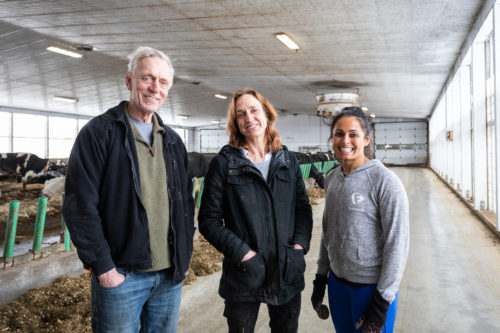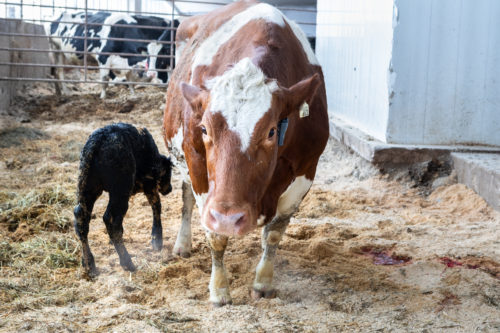A mom takes a trip to an organic Ontario dairy farm to see how healthy food is made.
By: Ben Kaplan
Shamsi Ladak is a 37-year-old mother of two who takes her health very seriously. A marathon runner, she’s currently training for her first ultra, and when she’s not teaching high school science and physical education in Toronto, where she also organizes Friday night workouts for her fellow teachers, she likes to make her family homemade meals. Recently, Ladak was persuaded by a naturopath to avoid dairy products. However, when she met with a nutritionist, Eric Williamson with the University of Toronto’s Faculty of Kinesiology & Physical Education, he reinstituted dairy into her diet. She immediately felt stronger. She said the difference was stunning. And she began to hit personal bests. “Dairy helps me get my protein and it has such good healthy fats that when I changed my diet, it was like night and day—I was so surprised, and I felt so much better,” says Ladak, who runs six days per week before her children awaken, often leaving the house at 5 a.m. “I began working with MyFitnessPal and measuring the grams of protein, carbohydrates and good fat that I ate and I found that, with dairy, there were so many important nutrients I was receiving that I couldn’t get from things like supplements and almond milk.”

Dairy has had a rough ride since the Canada’s Food Guide updated its recommendations, removing dairy from a food group and recommending water as the drink of choice. Of course, milk has long been associated with a runner’s recovery, and dairy products like eggs and Greek yogurt also contain the type of good fats and protein the body needs. While Olympic runners (and moms) like Melissa Bishop and Krista DuChene have come onboard as vocal dairy defenders—if such a category even needs to exist—Ladak decided she wanted to see how organic dairy products were made and took a recent trip to the source. She drove about 120 kilometres north of Toronto to the Mapleton’s Organic Dairy Farm, where Martin de Groot and his daughter Arwa have ruled the roost for nearly 40 years. Their farm is practically an advertisement for a healthy, all-natural life.
“Trends come and trends go, but that means very little to us, because we know how good natural food really is,” says de Groot, who took us on a tour of his working farm, where goats, sheep, turkeys and chickens all live in harmony with almost 90 cows. “We’re environmentalists and farmers and everything we do—from what we feed the animals to how we treat them to how we power our farm—is in harmony with nature and all-natural, GMO-free. We know how good dairy is because we know that the best food is real.”

Williamson, the UFT nutritionist, conducted a study recently written up in Runner’s World showing that protein requirements are higher than what athletes are currently consuming for optimal performance. Most athletes currently consume 1.2 g/kg (females) to 1.6 g/kg (males) of protein, but he suggests 1.8 g/kg would be better. Not surprisingly, dairy is a terrific—clean—protein source. “There is an overwhelming amount of support for the outcomes of good health from dairy,” Williamson says. “It has lots of great things that runners need, like protein, calcium and vitamin D, but it also other minerals that can be hard to find elsewhere.” Those other minerals could be the X factor, and scientists are working hard as we speak to find out exactly what the hidden molecular properties are. However, walking around the Mapleton’s Organic Dairy Farm, it’s hard not to be seduced by the peacefulness and simple harvest. While Bliss, their Australian Shepherd, roams freely throughout the grounds, we see the animals and the
solar power and the silos where their homegrown feed is preserved for the winter. When Ladak enters the oversized barn, her decision to return to dairy seems reinforced. It’s not just personal bests that she’s after; she wants to feel good, and feel strong. “It’s just so simple,” she says. “We are what we eat.”
Dr. Brian Roy is with the Department of Kinesiology at Brock University in St. Catharines, and, for him, a runner’s decision to choose dairy comes down to our energy needs. “Dairy is energy dense and nutrient-beneficial and we’ve seen studies that show athletes who consume dairy lose body fat and gain lean mass,” says Dr. Roy. “It’s also a complete food with no additives or antibiotics, and a clean, consistent product that’s inexpensive and available everywhere. I feel comfortable recommending dairy for almost anyone.”
For Shamsi Ladak, the decision to switch back to dairy for her ultramarathon training was easy. Her relationship with Eric Williamson has become closer and together they’re coming up with the right food combination to prepare for her ultra marathon in Niagara Falls in October. On the bucket list is qualifying for Boston, and seeing as many girls as possible participate on her cross-country team. The energy she’s receiving from dairy is working. Martin de Groot doesn’t think the way a runner should eat is really that complex. “The problem I have is with anyone who takes things to extremes—meat, veggies and dairy, everything in moderation, that’s how you eat healthy,” he says. “Dairy is an all-natural food and you know where it comes from. It’s nature’s perfect food, and it doesn’t get any better than that.”
Please note: This is a sponsored content post for Dairy Farmers of Ontario.






 Our Magazine
Our Magazine

Cool story Shamsi!!